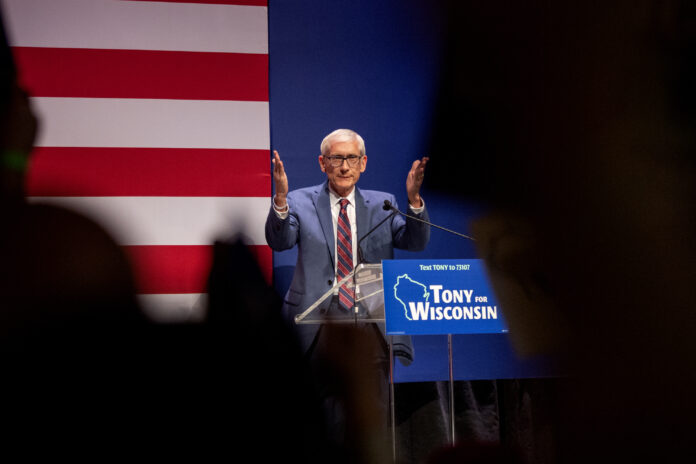Despite our differences, Americans agree that government should be efficient, effective, and accountable. Yet in many states with divided governments, this broad consensus is bizarrely being ignored. Republican legislatures are passing basic good-government reforms, only for Democratic governors to block them from becoming law. As a former state legislator, I’m deeply worried. Broken programs aren’t getting fixed, while taxpayers are stuck with a bill that shouldn’t exist.
The most recent example comes to us from Wisconsin. This month, Democratic Governor Tony Evers vetoed a series of simple reforms that would protect taxpayers and promote work in the state’s welfare system. In the spring, 80 percent of Wisconsin voters approved a non-binding referendum connecting welfare to work, which has the benefit of improving the economy while saving the state money. In response to the vote, the Republican legislature took baby steps to reflect the people’s will, yet Governor Evers wouldn’t even go that far.
It’s impossible to overstate how understated the Republican reforms are. One bill would have closed a so-called “ghosting” loophole in unemployment insurance, in which people keep getting taxpayer money while not showing up for scheduled job interviews. Another bill would have cross-checked unemployment insurance rolls with other agencies, ensuring that people receiving state support are actually eligible. Other bills were even more basic: one merely renamed unemployment insurance as “re-employment assistance,” to better indicate the program’s purpose of helping people find work.
Who could oppose such basic reforms? Lawmakers weren’t fundamentally changing welfare; they were simply ensuring that it work as intended, while cutting well-known waste, fraud, and abuse. The same was true with multiple bills Governor Evers rejected the year before. One tied unemployment insurance to economic conditions, the better to help laid-off workers in tough times while protecting taxpayers in boom years. If such reforms are radical, then nothing qualifies as common sense.
Wisconsin is far from unique. The same story is playing out in Arizona, where newly elected Democratic Governor Katie Hobbs has killed thoroughly unobjectionable—even obvious—good-government fixes.
Since the start of this year, Governor Hobbs has vetoed at least three Republican-backed bills to improve program integrity and accountability. One of them was similar to Wisconsin’s welfare reforms. It would have closed loopholes and modernized unemployment insurance, incentivizing recipients to look for work while guarding against fraud and abuse. Such policies have sailed through in other states with virtually no opposition on either side of the aisle.
Jim Vondruska/Getty Images
Governor Hobbs also vetoed a bill to give the legislature a say in the state’s major regulations. It would have ensured that the people, through their representatives, have a say in all the laws that govern them—basic accountability in a democracy. Yet a Democratic governor stands in the way.
Then there’s Kansas. Once again, Republican lawmakers passed modest improvements to a state welfare program. Once again, a Democratic governor said no.
The Sunflower State has been focused on the longstanding federal policy that able-bodied adults without young children work or volunteer as a condition of receiving food stamps. Yet Kansas had never fully implemented this work requirement. In 2022, the state legislature passed a bill to better align with federal law. Governor Laura Kelly swiftly vetoed it. The legislature returned this year with another expansion, earning another veto. Fortunately, the state legislature overrode Governor Kelly both times. Kansas now requires a few thousand more able-bodied adults to work for welfare, as Congress intended.
It’s particularly concerning that welfare reforms account for most of the measures these governors have vetoed. Welfare programs are the largest expense in state budgets, and with welfare rolls skyrocketing in recent years, taxpayers are counting on elected leaders to ensure that tens of billions of dollars are well spent. Instead, Democratic governors are blocking Republican attempts to make welfare work, costing taxpayers huge sums while letting waste, fraud, and abuse spread far and wide.
Americans deserve better. In years gone by, Republicans and Democrats would have put aside their differences to do the hard work of making government work. Apparently, those days are gone, and when it comes to welfare in particular, Democrats show essentially no interest in protecting taxpayers or even providing welfare recipients with a better path. If Democratic governors won’t make government efficient, effective, and accountable, then voters need to hold them accountable at the ballot box.
Tarren Bragdon, a former member of the Maine House of Representatives, is chief executive officer at the Foundation for Government Accountability.
The views expressed in this article are the writer’s own.


